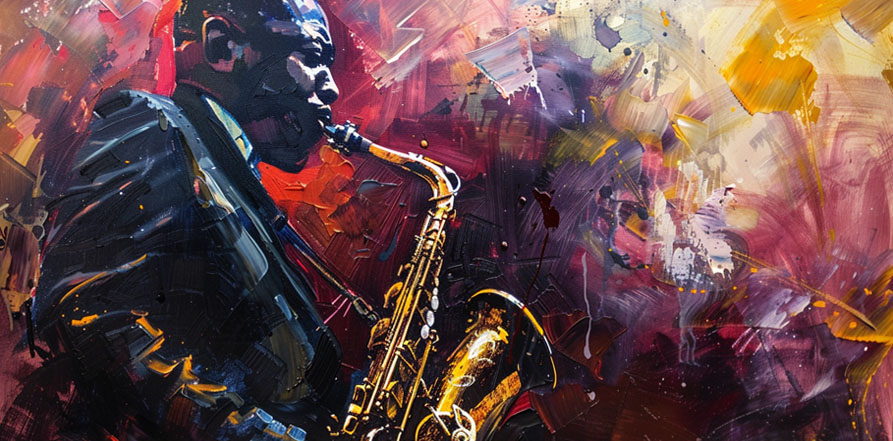By Donnie Yance
September 23 marks the birthday of musical legend, John Coltrane.
When Coltrane stepped to the microphone, he wasn’t just performing—he was giving a homily or a sermon. His saxophone became a conduit for what he called “spirit communications,” transforming concert halls into sanctuaries. Each solo was a sermon without words, each phrase a prayer ascending.
The very structure of his improvisation mirrored the rhythm of spiritual practice: the patient building of themes, the sudden eruptions of divine insight, the return to contemplative quietude. In “A Love Supreme,” you can hear him cycling through the stages of devotion—supplication, gratitude, ecstasy, surrender—all within the span of a single breath through his horn.
This wasn’t performance for its own sake. Coltrane understood what mystics have always known: that repetition opens doors to transcendence. His famous “sheets of sound” weren’t technical showmanship but spiritual discipline made audible, like the repeated mantras of monks or the circular breathing of ancient prayer practices.
The Healer’s Improvisation
Coltrane’s approach to music has profoundly shaped how I practice healing. Just as he never played the same solo twice—always listening, always responding to what the moment demanded—effective healing requires this same quality of deep listening and adaptive response.
As Albert Ayler observed: “Coltrane was like a visitor to this planet. He came in peace and he left in peace; but during his time here, he kept trying to reach new levels of awareness, of peace, of spirituality. That’s why I regard the music he played as spiritual music—John’s way of getting closer and closer to the Creator.”
There’s a story that captures this perfectly. One night, Coltrane performed “A Love Supreme” with such transcendent power that everything about the performance became sublime. When he finished and walked offstage, his drummer heard him breathe two words: “Luke 2:29″—”Lord, now let thou thy servant depart in peace, according to thy word.” It was a unique moment of glory, and Coltrane himself recognized that something beyond human achievement had occurred. He had touched heaven and knew he had fulfilled his purpose.
In my work with the Mederi Care healing model, I’ve learned that like jazz, healing happens in the spaces between—between protocol and intuition, between ancient wisdom and modern science, between practitioner and patient. Coltrane showed me that mastery isn’t about rigid adherence to form, but about developing such intimate knowledge of your craft that you can respond authentically to whatever arises.
When he said, “All a musician can do is to get closer to the sources of Nature, and to feel as though he or she is in communion with the natural laws,” he could have been describing the healer’s path.
Both require us to attune ourselves so sensitively that we can “hear and register—clearly and accurately—the silent communications” of the forces we’re working with, whether they’re musical or medicinal.
The Creative Destruction of Healing
Coltrane never stopped creating, understanding a fundamental truth that applies equally to music and medicine: In order for creation to take place, there must be a prior destruction; a space must be cleared in which to begin again. This principle governs both the grand cycles of nature, where forest fires nurture new growth and stellar collapse births fresh stars, and the intimate moments of human transformation, where we must often dismantle our assumptions before we can build something meaningful in their place.
Harmony in Practice: What Coltrane Taught Me About Medicine
Listening to Coltrane practice changed how I approach healing. He would spend hours working on a single phrase, not merely to perfect his technique but to discover what lived inside that musical moment. This same quality of deep listening—what he called being “sufficiently sensitized”—became central to my development of Mederi Care.
In both jazz and integrative medicine, which I prefer to call Unitive medicine when speaking about Mederi Care, healing happens in the spaces between notes. Coltrane taught me that true improvisation requires profound preparation: knowing your scales so deeply that you can forget them, understanding your instrument so completely that it disappears. In healing work, this translates to mastering the fundamentals—botanical medicine, nutrition, physiology—so thoroughly that intuition can emerge.
Just as Coltrane’s quartet achieved something beyond the sum of its parts, effective healing requires the same kind of attentive collaboration between practitioner and patient, between therapeutic modalities, between scientific knowledge and spiritual wisdom. The interplay between Tyner, Jones, Garrison, and Coltrane mirrors the dynamic balance I seek in Mederi Care—each element distinct yet inseparable from the whole.
You can listen to “A Love Supreme” here: https://www.youtube.com/watch?v=vMCHDC2Lurk
About the Author:
Donald R. Yance is the founder of the Mederi Center. A Clinical Master Herbalist and Certified Nutritionist, Donnie is renowned for his extraordinary knowledge and deep understanding of the healing properties of plants and nutrition, as well as of epigenetics, laboratory medicine, oncologic pathology, and molecular oncology. He is a professional member of the American Herbalists Guild, National Association of Nutrition Professionals, Academy of Integrative Health and Medicine, and the Society for Integrative Oncology.

